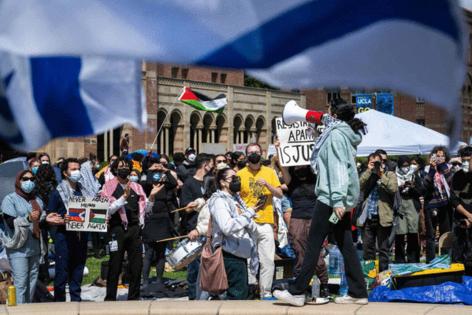At USC, arrests. At UCLA, hands off. Why pro-Palestinian protests have not blown up on UC campuses
Published in News & Features
LOS ANGELES — At the University of Southern California, Los Angeles police officers in riot gear swarmed the campus, arresting 93 pro-Palestinian protesters and clearing their tent encampment.
Across town at the University of California, Los Angeles, scores of Palestinian supporters set up about 20 tents, created a perimeter around their “Palestine Solidarity Encampment” and peacefully protested day and night — all without arrests, suspensions or intervention by campus staff, who watched from the sidelines. Private security guards with bikes separated the pro-Palestinian group from Israel supporters, and UCLA eventually added metal barricades after counter-protesters repeatedly tried to breach the encampment and in at least one case witnessed by the Los Angeles Times entered and shoved a woman to the ground.
The scenes this week illustrate starkly different responses to campus protests, which are sweeping the country as students at more than 20 colleges and universities have launched encampments, demonstrations and other actions to express solidarity with Palestinians, urge an end to Israel’s military operations in Gaza and demand divestment from companies that do business with Israel.
USC — along with other private institutions such as Columbia and Pomona — cracked down on violations of campus rules with police force and student arrests.
In the public University of California system, by contrast, UCLA, the University of California, Berkeley and the University of California, Santa Barbara have used a far lighter hand, tolerating students who flouted bans on overnight camping and other rules as long as they remained peaceful and did not impede campus operations or interfere with teaching and learning.
Part of the difference is rooted in the legal requirement for public universities to honor the First Amendment, which does not apply to private institutions. But not all public campuses have refrained from an aggressive response. The University of Texas, Austin, for instance, sent in armed state troopers who arrested more than 50 people this week for staging what witnesses said was a peaceful protest. The university president, defending his response as a legitimate action to maintain campus order, is facing a faculty vote of no confidence.
The more permissive UC response has been shaped by decades of experience with high-profile protests and in particular the 2011 uproar at the University of California, Davis, where campus police pepper-sprayed students who were peacefully protesting economic and social inequality during the Occupy movement. Video of the incident went viral, and the widely condemned police actions resulted in the firing of at least one officer, a $1-million legal settlement with the student demonstrators and a UC systemwide review and report on how best to handle campus protests.
The report, noting the need to balance First Amendment rights with campus safety and security, made 50 recommendations, placing communication and dialogue as a “cornerstone” of responses, with police force used as the very last resort. In a key underlying principle, the report called for “a substantial shift away from a mindset that has been focused primarily on the maintenance of order and adherence to rules and regulations to a more open and communicative attitude.”
“What’s so bad about students pitching tents on a green? That doesn’t threaten the core teaching and research mission,” said Christopher Edley Jr., a UC Berkeley law professor who co-authored the report. “It’s messy and appears to create turmoil, but ... you’re dealing with a large community of 20-year-olds who we expect to be passionate and who we know are collecting experiences as well as knowledge. It’s incumbent on us to be as tolerant as possible without compromising fundamentals.”
Even some sharp critics of pro-Palestinian protests, which they see as antisemitic, have refrained from calling for an end to the encampments. Democratic Assemblymember Rick Chavez Zbur, whose district includes the UCLA campus, said he was “appalled and disgusted” by calls to destroy Israel and praise for the Hamas militant group and believes UC officials are not doing enough to safeguard Jewish students. But he said he supports the rights to free speech, to peacefully assemble and to protest, and would continue to fight for their protection “no matter how strongly I may disagree.”
...continued
©2024 Los Angeles Times. Visit at latimes.com. Distributed by Tribune Content Agency, LLC.







Comments